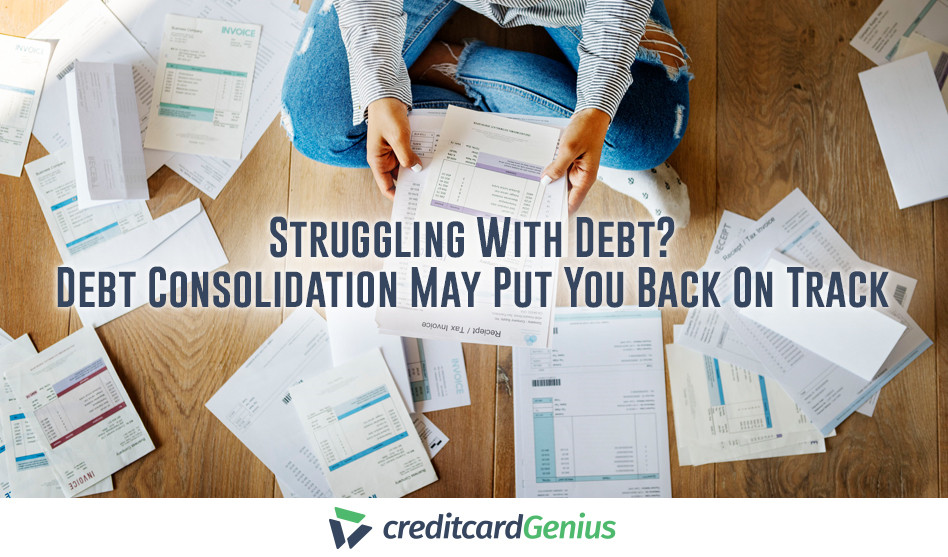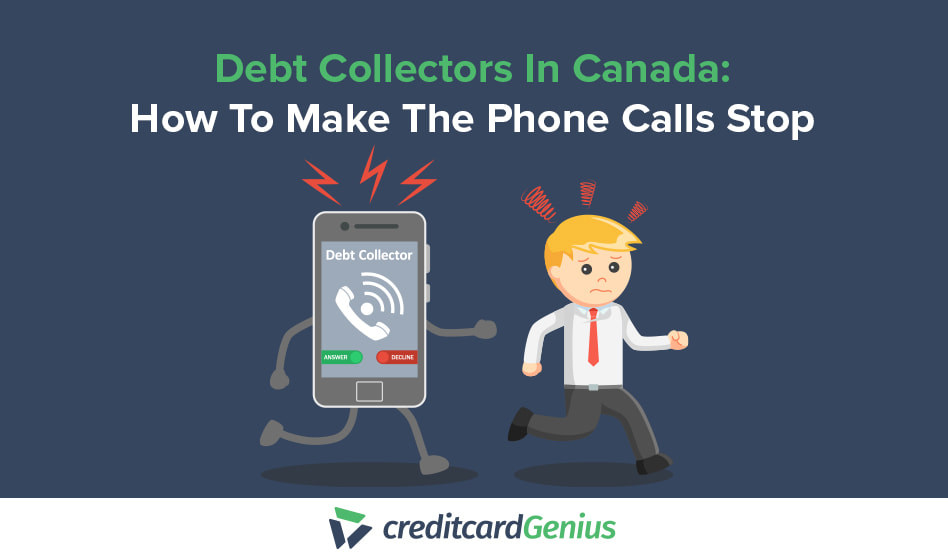Constant calls from debt collectors in Canada are something nobody wants to face, but ignoring them will only make the situation worse.
Sometimes it may seem like the calls are getting even more frequent and perhaps more aggressive, but doing nothing can put you at risk for legal action and completely tank your credit score. It could also deflate any hope you may have had for borrowing again in the near future, as you will be seen as radioactive to any other lender out there as soon as they perform a credit inquiry.
But just because you’re getting these incessant calls that seem intimidating, doesn’t necessarily mean you’re on the hook, or even that you owe the money.
This is why it’s important to know what a debt collector can and can’t do and how you should respond depending on the situation.
Never miss an amazing deal again + get our bonus 250+ page eBook for FREE. Join 50,000 other Canadians who receive our weekly newsletter – learn more.
What is a debt collector in Canada?
Before you can deal with a debt collector, you need to actually know who you’re dealing with.
Debt collectors in Canada work for a debt collection agency, which could be one of several hired by a lender to collect on unpaid debts that have been defaulted on. The lender is either using the collection agency to assist them in recovering the unpaid debt or perhaps the lender has already sold the debt to a collection agency and it’s the collection agency themselves trying to collect to turn their own profit.
Either way, once your debt has been passed to a legitimate debt collector, you will first receive a letter detailing the following:
- the name of the debt collection agency,
- the name of the lender you owe the debt to, and
- the amount that you owe.
In an interview with creditcardGenius, Doug Hoyes, licensed bankruptcy and insolvency trustee with over 30 years experience and co-founder of Hoyes, Machalos & Associates Inc. – one of Canada’s largest personal insolvency firms, had this to say about the letter:
“In Ontario, and pretty much every jurisdiction in North America, it’s a pretty standard rule that the debt collector is required to notify you in writing before they can be calling you.”
As soon as you receive this letter, you are best to contact them right away to address the situation. However, bear in mind, there are several things debt collectors in Canada can and can’t do in their pursuit of the debt they’re collecting and we’ve summarized them in the table below:
| What a debt collector CAN do | What a debt collector CAN’T do |
|---|---|
| * Send a letter detailing who they are, how much you owe, and to which creditor. | * Start a legal action outside of two years after you default on a debt |
| * Call you at work or at home within a set period of time (Monday to Saturday, 7:00 a.m. to 9:00 p.m. and Sundays 1:00 p.m. to 5:00 p.m.) | * Pursue you after you file for bankruptcy or initiate a consumer proposal |
| * Sue you for the debt you owe | * Harass your neighbours, family, and friends |
| * Use robo dialers | * Call you on a statutory or public holiday |
| * Contact your co-signer | * Harass you with threatening or abusive language |
| * Contact your employer to confirm your employment | * Misrepresent the situation or give false information |
| * Contact your friends, family, neighbours, or employer to confirm your address and phone number | * Add collection-related costs to the amount you owe other than legal fees and NSF fees for payment amounts you submitted. |
Let’s take a look at the points above in more detail so you know exactly where the line is as far as what a debt collector can and can’t do.
What can a debt collector in Canada do?
A debt collector is allowed to call you at work or at home to try and collect your debt during the very specific windows of Monday to Saturday, 7:00 a.m. to 9:00 p.m. and Sundays 1:00 p.m. to 5:00 p.m. local time, but only after outlining their purpose to you in writing.
They can contact your friends, family, and neighbours, but only to find out your address and phone number to contact you to discuss repayment of your debt. They can also contact your employer to do the same, as well as to confirm where you work.
If you ignore them or do not make arrangements to repay your debt, they are free to sue you to try and legally force you to pay the amount owing, which they may do, especially if they know you have the means to pay back the debt, given the information they can see on any paperwork associated with the outstanding debt, such as a loan application.
Said Hoyes about debt collectors:
“They can phone you, they can send you letters, they can take you to court, and they can sue you, so they do have rights. It kind of makes sense. If creditors could never collect, then nobody would pay any of their bills”
The only other person they can contact in pursuit of collecting an outstanding debt besides you, the borrower, is your co-signer (if you have one).
A co-signer is a person who signed a contract with your creditor agreeing to be responsible for any outstanding debt if you were unable to pay it back. The advantage of having a co-signer is you may qualify for loans, credit cards, or any other purchase where financing is necessary that you otherwise wouldn’t be able to if only your credit history and credit score were taken into consideration.
A co-signer can help you qualify because their credit score and credit history is taken into account on any loan application and likely their credit is stronger than yours, so you are able to qualify. The problem is if it turns out that you default on the loan, your cosigner is suddenly just as much on the hook to pay back your debt as you are. This is why a debt collector can pursue them as well.
What can’t a debt collector in Canada do?
Of course, there are limits to how far a debt collector can take their pursuit of recovering your debt and earning their commission.
They can’t harass you – calling you at all hours of the night and day – but, it turns out, it’s a little more complicated than that, according to Hoyes:
“They can’t be phoning you at 3:00 in the morning, they can’t be harassing your neighbours or family, and they can’t be calling you every 10 minutes, but, of course, a lot of them use robo dialers so you’re getting a phone call every hour and if you don’t pick it up, you’re just getting another phone call in another hour, so you think they’re calling you every hour, but they really aren’t. It’s just a machine that’s calling you.”
But just because debt collectors can get away with this practice on a technicality, doesn’t mean there won’t be repercussions for them. If you feel that a collection agency is violating the law, and some of their tactics are over the line, you can always call the consumer affairs office in your province and file a complaint.
You may feel like doing so is futile and purely a symbolic gesture, but Hoyes assures lodging a complaint against a collection agency can have real world consequences for them:
“A collection agency wants to get paid and wants to stay in business, but if someone launches a complaint against them, they’re at risk of not being used again by creditors, so it’s in their best interest to follow the law. The collections industry is fiercely competitive, so any lender can simply move on from one and use another without a second thought.”
Other tactics a debt collector cannot use include using unreasonable pressure against you to get you to pay back your debt, convincing your friends or family to pay the debt for you (unless they are a co-signer), and adding an additional amount of money to what you owe (unless those costs are either non-sufficient funds charges related to payments you’ve attempted to pay or legal fees).
Check your province’s statute of limitations on debt
The biggest limitation on the power of debt collectors in Canada has to do with the statute of limitations on legal action. Though there is no time limit on how long a debt collector has to collect a debt that remains unpaid (unless the debtor declares bankruptcy or initiates a consumer proposal when all pursuits must stop) which is the time limit on when a debt collector can sue you.
This window is 6 years for federal matters, but for everything else, it varies in every province. Let’s take a look:
- Alberta – 2 years after the debt is known or 10 years after the claim arose, whatever comes first.
- B.C. – 2 years
- Manitoba – 6 years
- New Brunswick – 6 years
- Newfoundland & Labrador – 2 years
- Nova Scotia – 2 years
- Northwest Territories – 6 years
- Ontario – 2 years
- Prince Edward Island – 6 years
- Quebec – 3 years
- Saskatchewan – 2 years
- Yukon – 6 years
The statute of limitations doesn’t forgive your debt, but once a debt collector is outside of it, they can’t legally collect. Hoyes had the following to say about what that means for you as the debtor:
“It’s kind of like wearing a bulletproof vest. They can shoot you, it’s going to be annoying, but it’s not going to have any lasting impact on you.
So, a collector can phone you, they can send you letters, but if they go to court to sue you, then you can also go to court and stand up and say to the judge, ‘Hey judge, this debt is too old.’ Assuming the judge understands the law and you can prove it, the case gets kicked out.”
How to successfully handle a debt collector call: 4 must-know steps
Okay, so now that you know your rights, it’s time to actually figure out how to handle a debt collector’s call.
1. Make sure you actually owe the debt
It may seem obvious when it’s all laid out like this, but the first thing you need to do when a debt collector calls is confirm that you actually owe the money.
Hoyes agreed with that sentiment:
“I can phone you up and say, ‘Hey man, you owe me money.’ Well, maybe I got the wrong guy or maybe you already paid it off.”
It does happen. The most common errors for debt collectors in Canada happen because two people with similar names live in the same city. One has a debt that has been passed to collections and the other does not.
Even debts that you’ve already paid can get passed to collections when collection agencies buy large packages of old files from various lenders. The lenders may not have updated their information before it gets passed to a collection agency and, not being the original creditor, the debt collector may have no idea they’re basing their actions off of old or inaccurate information.
Meanwhile, identity thieves can take out loans in the names of their victims and then default on them to the point where by the time a debt collector reaches out to the person who supposedly owes money, that person has no idea even that their identity has been stolen.
There are also scams where con artists will pose as debt collectors to try and extort money from people over the phone or get their personal information to steal their identity.
A good way to tell if you’re being scammed, as opposed to being contacted by a legitimate debt collector, is that you hear from them outside of the hours discussed in the section above that are designated by law. They also may be breaking other laws of debt collection such as overly aggressive language or abuse. Plus, when you bring up your debt, it may seem like they have no idea about it and make no attempt to verify your identity themselves.
No matter what’s happening, if you have proof that you don’t owe the money, do what you can to send it to the collection agency by asking for their email or mailing address. If they won’t give it to you, or they continue to call even after you’ve sent it, you’re either being scammed or it’s time to launch a complaint with your local consumer affairs office.
2. Ask for proof of debt in writing
To be honest, you don’t even really have to ask. As Hoyes explained earlier, in most jurisdictions, debt collectors are required to send you proof that you owe them money, in writing, before they even are allowed to call you.
If you live somewhere where this is not the case, then, yeah, get a written letter outlining who the debt collector is, the collection agency they work for, how much you owe, and the creditor the debt was originally owed to.
Hoyes told us why clarity is so important when dealing with debt collectors in Canada:
“It’s common that the original creditor will try to collect and they will pass the debt off to a third party collection agency, and then, after a few months, they may pass it off to another third party collection agency, so it’s not uncommon to be getting calls for the same debt from more than one agency, so getting some clarity is very important.”
3. Send them a written request to stop calling you
There’s nothing stopping you from sending a letter to a debt collector to stop calling you, but you may unintentionally escalate the situation by doing so. Hoyes would tell you that sending this kind of demand letter is ineffective:
“Sure, you can send a letter, but I don’t know what good that does you.
Let’s say I did that. I tell the collection agent that I’m going to send them a letter telling them not to call me. They’ll say, ‘Fine, I guess I’ll just go to court and sue you then.’ I guess they’re not calling you at work anymore, but now you have a lawsuit on your hands.”
4. Pay the amount owing
Okay, but let’s say you actually do owe the money and the debt collector is calling you within the statute of limitations. Well, the best way to get debt collectors in Canada to stop calling you is to actually pay the money. Hoyes agrees:
“If we’re talking about a cell phone bill from a year ago for $500 and you can pay the $500, then you should do that.”
But if you can’t come up with the money all at once, that’s when you should start weighing your options.
How to make a plan to pay off your debt: weighing your options
Of course, paying the money is always the first option when you actually owe a debt, but if you can’t come up with all the money, there’s still hope because you still have several options:
- try to make a deal to settle the debt at a lower amount than what you actually owe,
- work out a payment plan with the debt collector,
- if small, take advantage of balance transfer credit cards to pay it off quickly,
- consider a debt consolidation plan, and
- declare bankruptcy or initiate a consumer proposal.
The good news is, that’s a lot of directions to go, but which one is right for you? Well, let’s take a look at the details of each one.
Offer to settle the dispute with a lump sum lower than the amount you owe
It might be surprising, but in some cases, it’s possible to pay back less than the full amount you owe to a debt collector.
Hoyes tells us how and why:
“If it’s an older debt, which it must be because otherwise a debt collector wouldn’t be calling you, offer to settle for less than the full amount owing.
Always put yourself in the position of the other guy. The debt collector wants to collect the money, earn their commission, and close the file, so would they rather get half the money right now, be done with it, and earn their commission or would they rather get 10% of the money every month for the next 10 months? If it’s me, I’d take option 1, so if the debt is older, debt collectors are more likely to accept less than the full amount owing.”
The last, but most important piece of an arrangement like this is to get it signed and in writing. You want to have it confirmed that once payment is accepted, the debt is now settled, and both parties can move on.
This step is the most important not just for your own records and peace of mind, but if you find yourself being hounded once again by debt collectors over this same debt, you’ll at least have something to show them that confirms you already paid it. This will hopefully get them to stop calling you.
Make a payment plan
Also, if you can’t come up with all of the money at once and the debt collector won’t settle the debt at lower than you owe (perhaps they know that you have enough assets to pay the full amount if push came to shove), then it’s advised you try the next best option – a payment plan. This is a tactic that Hoyes fully endorses.
“Going with my earlier $500 cell phone example, say something like, ‘Look, I can’t give you $500 today, but I can give you $250 when I get paid on Friday and then I can give you another $250 in two weeks.”
Understand though, that the debt collector wants as much money as they can get, as soon as they can get it. They don’t want payment plans because they don’t want to have to be depositing money from you every week or month in dribs and drabs.
Hoyes agrees:
“It will be easier to make a deal with a debt collector if you can give them a chunk of cash.”
Therefore, the more money you can give them per payment, the more likely they are to agree to a payment plan, but you have to be realistic. Don’t make promises you can’t keep. If you say you’re going to pay a certain amount on a certain date, do it.
Take a hard look at your monthly budget and actually see where you can cut your spending so that you can prioritize your debt repayment. Realize, the first step to rebuilding your credit is paying back the money, so make sure the payment you say you’re going to make is something you can actually do and take it seriously.
Take advantage of balance transfer credit cards
If your debt hasn’t gone to collections yet, but you suspect it may be heading in that direction, and it’s small enough that it can be relegated to one or two credit cards, a balance transfer promotion can save you significant amounts of money in interest while giving you a chance to wipe out all the debt in one shot.
A balance transfer promotion works by offering a lower than average interest rate or no interest whatsoever for a limited time that’s usually 6 or 12 months, depending on the credit card.
Sounds great, right? Well, it can be if it’s managed correctly, but it’s not without some drawbacks.
Often you can’t transfer a balance between two credit cards offered by the same issuer, so you’ll have to make sure your existing balance is on a credit card offered by a completely different bank than the credit card you are transferring it to.
Also, every balance transfer comes with a balance transfer fee that’s usually 3% of the balance you’re transferring, so you will need to be able to afford that on top of paying back the balance you’re transferring within the low or no interest promo period.
If you can handle that, consider applying for one of the below options:
| Credit Card | Balance Transfer Promotion | Rewards | Annual Fee, Income Requirements | Apply Now |
|---|---|---|---|---|
| 0% interest on balance transfers for 12 months (terms) | None | * $0 * None |
Apply Now | |
| 0.99% interest on balance transfers for 9 months (terms) | * 1 Mile per $25 spent on all purchases * 3x the Miles for every $25 at participating Air Miles partners * 2x the Miles for every $25 spent at any eligible grocery, liquor, and wholesale stores |
* $0 * $15,000 personal |
Apply Now | |
| 0.99% interest on balance transfers for 9 months (terms) | * 3% cash back on groceries (up to $500 per month) * 1% cash back on recurring bill payments (up to $500 per month) * 0.5% cash back on all other purchases |
* $0 * $15,000 personal |
Apply Now | |
| 1.95% interest on balance transfers for 6 months (terms) | * 2% cash back on purchases in up to 3 Money-Back Categories * 0.5% cash back on all other purchases |
* $0 * $12,000 personal |
Apply Now |
If you want to learn more about any of the above credit cards, including their balance transfer terms and the other benefits they offer, read 2022’s Best Balance Transfer Credit Cards In Canada.
Examples of how balance transfer credit cards can save you money
Just to show off the potential of a great balance transfer promotional rate to save you money, let’s take a look at our best balance transfer credit card in 2022.
The
| Amount Of Debt | Total Saved Compared To A 19.99% APR In A Year |
|---|---|
| $1,000 | $200 |
| $5,000 | $1,000 |
| $50,000 | $9,996 |
Whether you’re saving $200, $1,000, or $9,996 on the above respective balances, those numbers are nothing to sneeze at. You have to take all of them seriously. So seriously in fact, that we recommend checking out a closer comparison of the above with the assistance of this handy-dandy visual aid:
As you can see, the higher your debt, the more you’re saving in interest.
But when you imagine that without a credit card with a 0% promotional balance transfer interest rate, you’d be paying almost $10,000 in interest on a $50,000 debt at a typical 19.99% annual interest rate, that’s a significant savings you can definitely use.
But remember, balance transfers cannot be performed on credit card debt that has already been passed to collections, so if you’re going to take advantage of these promotional interest rates on balance transfers, it would have to be before a debt collector calls.
Use debt consolidation to help make repaying your debt more manageable
Debt consolidation is certainly an option for managing your debt and paying back your creditors, but there are several caveats that come with working with a credit counsellor on a debt consolidation plan.
What is a debt consolidation plan, you ask?
A debt consolidation plan or program is when a debt counsellor negotiates with each of the creditors behind any unsecured debt you may have and gets them to agree to settle the debt at a lower amount and accept one monthly payment until the outstanding debt is repaid.
As part of the plan, the credit counsellor will consolidate all of your outstanding debts from several different creditors into one lump sum that you will make a payment on every month and then the credit counsellor will distribute a portion of your payment to each creditor.
The structure of a debt consolidation plan is very similar to a consumer proposal, but there are several issues with a debt consolidation plan that don’t happen with a consumer proposal.
First of all, debt consolidation is almost always a for-profit scheme that has you paying a credit counsellor to help settle your debt, while also trying to pay back the debt itself.
Hoyes agrees:
“They are almost always a scam. It would be like having a medical issue and instead of going to a doctor, you go see a medical consultant. A person who talks to you and gets some information about your sickness or injury and then ultimately refers you to a doctor.
Of course, that doesn’t make any sense, but usually what they do is they will call up a licensed insolvency trustee like myself and say, ‘I have this guy for you, I’ve already charged him $2,000 for advice, and I’m going to refer them to you. Can you do the consumer proposal please? In most cases, they are nothing more than a referral service for trustees, but you’ve paid the money, so just go the trustee directly.’”
That being said, there are some credit counsellors that are not-for-profit and don’t charge for a debt consolidation plan. However, even if they are legitimately negotiating with your creditors on your behalf, that doesn’t mean your creditors have to agree to any payment plan they propose.
On the other hand, a consumer proposal is a legally binding agreement, so if two out of three creditors agree to the terms of the proposal, the third one has to agree according to the law.
However, you can also try to pay back multiple smaller debts with a debt consolidation loan. Find out what those are and how they may make your debt more manageable here.
Consider declaring bankruptcy
Of course, bankruptcy is always the option of last resort. Though it will stop calls from debt collectors the moment you enter into bankruptcy proceedings and is a fresh start on your finances once the process is over, it will also plummet your credit score to the lowest possible rating – an R9 – and make you radioactive to lenders for at least six years.
Plus, while you’re in bankruptcy proceedings, you will be subjected to additional consequences that Hoyes is well aware of:
“The biggest thing you lose in a bankruptcy is a portion of your surplus income over and above what you’re legally allowed to keep according to your province of residence. The more you make, the more you have to pay, so if you think your situation is going to improve in the future, a consumer proposal is the better option.”
A consumer proposal is also a legally binding agreement between you and your creditors administered by a licensed insolvency trustee, like a bankruptcy, but in a consumer proposal, you don’t have to give up your assets.
Instead, a bankruptcy and insolvency trustee will work with your creditors to consolidate all of your debt into a lump sum that’s lower than what you would’ve paid each creditor individually. You will make one monthly payment which will be distributed to your creditors by the trustee on a prorata basis, so your biggest creditor will get more of your payment than your smallest creditor based on how much you owe them.
Meanwhile, in both a bankruptcy and a consumer proposal, you will be required to attend credit counselling classes. Hoyes detailed the goal of these sessions:
“The goal of those sessions is to give you some tools and techniques to manage your money so you’re less likely to get into financial trouble in the future.”
Tip: Don’t promise anything you can’t keep
No matter the option you choose to deal with a debt that has entered collections, don’t make promises to a debt collector that you can’t actually keep.
Hoyes agrees:
“Never commit to something that you can’t do. Don’t promise to pay $200 on Friday if you can only pay $100 on Friday. You have to be realistic.”
If you have tons of debt from many different sources, you need to deal with it all at once.
Whether consolidating your debt through a debt consolidation loan, a debt consolidation plan, or a legally-binding consumer proposal, tackling your debt all at once is the best option for getting rid of it as fast as possible and giving yourself a clean slate.
However, if you can’t pay it back all at once, don’t get discouraged. You can always try and work out a repayment plan with the debt collector.
If your debt is just too large and bankruptcy is the only option, remember bankruptcy proceedings don’t last forever and the faster you deal with your debt, even with a bankruptcy, the faster you will be on the road to rebuilding your finances.
Your turn
The best way to deal with a debt collector is to talk to them, verify you do really owe the money, and either pay it back right away or work out some kind of deal with them, whether that be a payment plan or debt settlement.
You don’t have to be intimidated and if you are being abused by a debt collector, you can always report them to your provincial government or they could be fake in the first place.
What about you? Have you ever gotten a call from a debt collector and if you have, how did you handle it?
Tell us your best debt collector stories in the comments below.
FAQ
How long can debt collectors try to collect in Canada?
There is no limit to how long debt collectors in Canada can try to collect a debt. However, there is a limit on how long they have to sue you. See the statute of limitations on debt in your province to find out how long they have where you live.
Is it possible to stop debt collectors from calling you?
Yes. You can either show them proof that you don’t owe the money they’re after, that you already paid it, or you can make arrangements with them to pay back the money you owe.
What can you do if a debt collector threatens you?
You can file a complaint with the consumer affairs office in your province and notify the lender that passed your debt to the offending collection agency.
Can a debt collector repossess your belongings?
In most cases no. A debt collector’s job is to get money from you and repossessing your stuff will cost them more money than the nominal return they might get from your stuff. Also, they need a court order to seize your stuff. The only circumstance where they don’t need a court order to take something of yours is if you gave them permission to place a lien on your property through some prior agreement with your creditor. See “What Is a debt collector?” for more on what debt collectors in Canada can and can’t do.
Do I have to pay the debt collector, or the original creditor?
You have to pay the debt collector, as your debt has been passed on to them by your creditor and noted on your credit report. If you try to pay your creditor, they will likely refer you back to the collection agency.
creditcardGenius is the only tool that compares 126+ features of 227 Canadian credit cards using math-based ratings and rankings that respond to your needs, instantly. Take our quiz and see which of Canada's 227 cards is for you.








 GC:
GC: 


































Comments
Leave a comment
Required fields are marked with *. Your email address will not be published.
Showing 1 comments